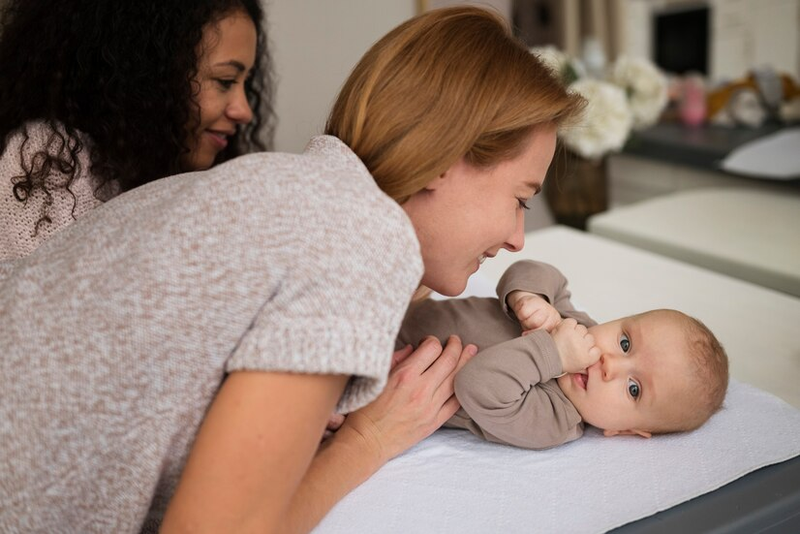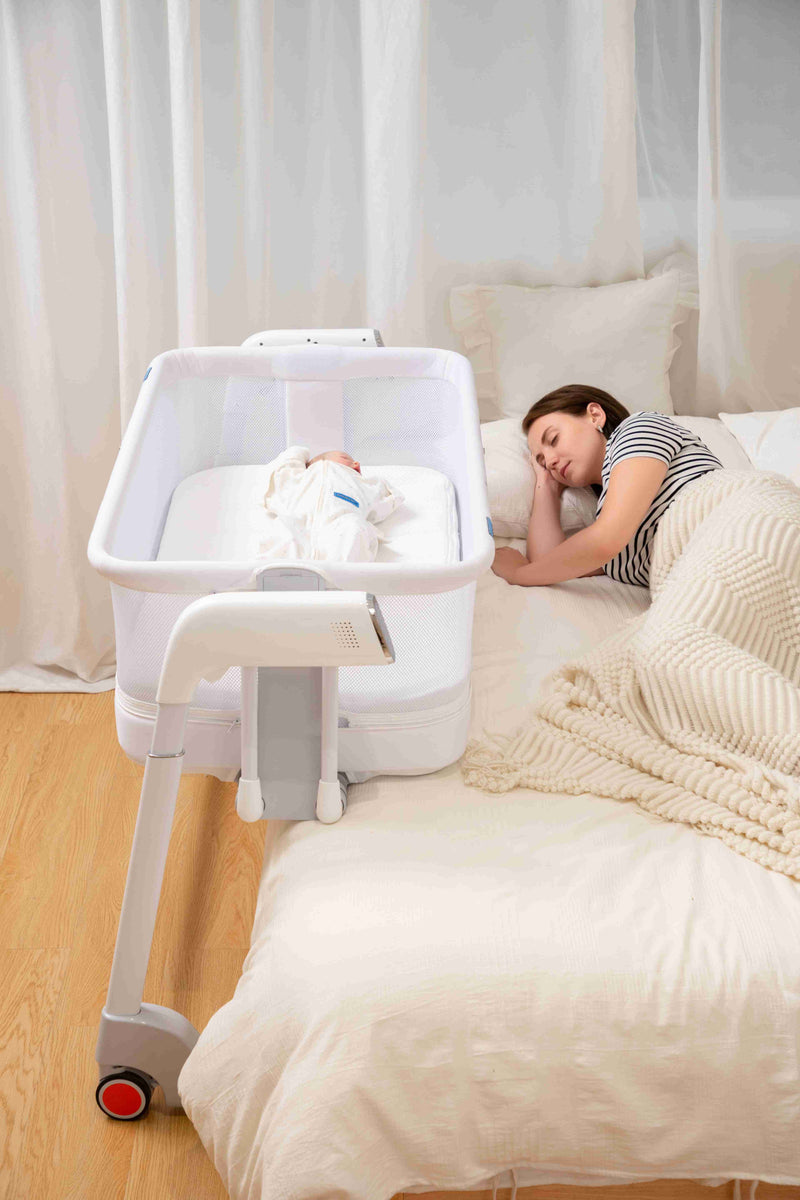How to Get an Overtired Newborn to Sleep: Expert Tips & Solutions
It's a paradox many new parents face: your newborn is clearly exhausted, but instead of drifting peacefully to sleep, they're fussy, crying, and seemingly fighting against the very rest they desperately need. This counterintuitive behavior is the hallmark of an overtired baby—a state that can be frustrating and exhausting for both baby and parents.
When a newborn becomes overtired, their little bodies actually work against sleep. Understanding the science behind this phenomenon and learning effective strategies to soothe an overtired newborn can make a significant difference in your family's sleep quality and overall wellbeing.
In this comprehensive guide, we'll explore why overtiredness happens, how to recognize the signs of an overtired baby, and most importantly, proven techniques to help your overtired newborn finally get the restorative sleep they need.
Understanding Overtiredness in Newborns
What Does Overtiredness Mean?
An overtired newborn is one who has been awake longer than their developing nervous system can handle. When babies stay awake beyond their natural wake windows, their bodies respond by releasing stress hormones like cortisol and adrenaline—the very chemicals that make falling asleep more difficult.
As Cleveland Clinic research explains, these "fight or flight" hormones activate to keep your baby alert, making it physically harder for them to settle down and relax enough to fall asleep. This creates a challenging cycle: the more tired they become, the harder it is for them to fall and stay asleep.
Why Do Babies Become Overtired?
Several factors can lead to overtiredness in newborns:
Missed sleep cues: Not recognizing early signs that your baby is ready to sleep
Wake windows that are too long: Keeping baby awake longer than their age-appropriate tolerance
Overstimulation: Too much activity, noise, or engagement
Irregular sleep schedules: Inconsistent nap or bedtime routines
Disrupted sleep: Frequent waking due to environmental factors, hunger, or discomfort
Signs Your Newborn Is Overtired
Recognizing the signs of overtiredness early can help you intervene before your baby becomes too exhausted to sleep well. Here are indicators to watch for:
Early Tired Signs
Yawning
Decreased activity
Quieting down
Less social engagement
Looking away or avoiding eye contact
Glazed expression
Droopy eyelids or red eyebrows
Signs of Progressive Overtiredness
Fussiness
Crying and screaming
Arching back
Pulling at ears
Difficulty settling
Clinginess
Rubbing eyes
Hyperactivity (often mistaken as being ready to play)
An important note: many parents misinterpret the "second wind" of hyperactivity as their baby not being tired, when it's actually a strong indicator of overtiredness. This sudden burst of energy is your baby's body releasing those stress hormones to fight fatigue.
The Science Behind Sleep in Newborns
Understanding why overtiredness happens requires some knowledge of how sleep works in newborns:
Wake Windows
Newborns (0-4 months) typically can only handle 45-60 minutes of awake time before needing sleep again. As babies develop, these wake windows gradually extend:
4-6 months: 1-2 hours
6-12 months: 2-3 hours
12-18 months: 3-4 hours
18 months-2 years: 4-6 hours
Respecting these age-appropriate wake windows is crucial in preventing overtiredness.
Sleep Pressure
Sleep pressure builds the longer a baby stays awake. When balanced correctly, this pressure helps babies fall asleep easily. However, when they stay awake too long, the body kicks into "overdrive," making it harder to settle down.
Cortisol's Effect
Research has shown that babies with later bedtimes have higher cortisol levels, which makes relaxation and sleep more difficult. This heightened alertness creates the frustrating situation where, despite being clearly exhausted, your baby actively fights sleep.
How to Get an Overtired Newborn to Sleep
When your newborn has crossed into overtired territory, these strategies can help them find their way to restful sleep:
1. Create a Calming Environment
Dim the lights significantly
Reduce noise or use white noise to mask disruptive sounds
Move to a quiet, less stimulating space
Keep the room comfortably cool (68-72°F/20-22°C)
2. Swaddle Securely
Swaddling recreates the snug feeling of the womb and can be remarkably effective for soothing overtired newborns. Be sure to use proper swaddling technique, keeping hips loose while securing arms. Important safety note: discontinue swaddling once your baby shows signs of rolling.
3. Use Motion to Soothe
Gentle, rhythmic movement often helps overtired babies calm down:
Walking while holding baby close to your chest
Gentle bouncing on a yoga ball
Swaying side to side
Rocking in a rocking chair
4. Try White Noise
White noise mimics the sounds babies heard in the womb and can mask household noises that might keep your baby alert:
Sound machines designed for babies
Fan noise (not blowing directly on baby)
Humming or "shushing" sounds
Heart beat sounds
5. Skin-to-Skin Contact
Direct skin-to-skin contact is soothing for newborns and can help regulate their nervous system:
Hold your unclothed baby (diaper on) against your bare chest
Cover both of you with a light blanket
Rock or sway gently while maintaining this position
6. Feed in a Calm Setting
Sometimes a feeding can help an overtired baby relax enough to fall asleep:
Dim the lights during feeding
Minimize disruptions and noises
Avoid unnecessary burping if baby is finally settling
Consider using a baby bassinet next to your bed for easier night feedings without fully waking your baby
7. Offer a Pacifier
The sucking reflex is calming for many babies and can help them transition to sleep:
Offer when your baby is calming down, not when actively crying
Gently hold it in place until baby engages with it
Some babies prefer specific shapes or materials, so you may need to try different types
8. Take a Break if Needed
If your attempts to soothe are not working and you feel yourself getting frustrated:
Place your baby safely in their crib
Take a 10-15 minute break to regroup
Return with renewed calm energy to try again
Preventing Overtiredness in Newborns
Prevention is always easier than addressing overtiredness after it occurs. Here are strategies to keep your newborn from becoming overtired in the first place:
1. Learn and Respond to Sleep Cues
Becoming attuned to your baby's unique sleep signals allows you to act before overtiredness sets in. Early intervention when you notice the first signs of tiredness (yawning, decreased activity, looking away) can prevent the overtired cycle.
2. Follow Age-Appropriate Wake Windows
For newborns, respect their need for frequent sleep:
0-4 weeks: 45-60 minutes maximum awake time
4-12 weeks: 60-90 minutes maximum awake time
3-4 months: 75-120 minutes maximum awake time
Remember that these are maximum guidelines—many babies need sleep sooner, especially when they're still very young.
3. Establish Sleep Routines
Even newborns benefit from consistent sleep cues:
Use a shortened, simple routine for newborns (3-5 minutes)
Consistently signal sleep is coming (swaddle, dim lights, quiet voice)
As baby grows, develop more structured routines before naps and bedtime
4. Prioritize Sleep Environment
Creating an optimal sleep setting helps babies fall and stay asleep:
Use blackout curtains for daytime naps
Maintain a comfortable temperature
Consider using a smart bassinet that provides gentle motion when needed
5. Balance Stimulation
While engagement and play are important, balance stimulating activities with quieter periods:
Watch for early signs that your baby is becoming overstimulated
Alternate engaging activities with calmer ones
Plan stimulating activities for the beginning of wake windows, not the end
6. Practice Flexible Consistency
While strict schedules aren't appropriate for newborns, a general predictable pattern helps prevent overtiredness:
Aim for a consistent wake time in the morning
Watch the clock alongside your baby's cues
Be flexible when needed, but try to maintain general patterns
Breaking the Cycle of Chronic Overtiredness
Some babies get caught in a pattern of chronic overtiredness, where each day builds on the sleep debt from previous days. Breaking this cycle may require a more concentrated approach:
1. Focus on an Earlier Bedtime
An earlier bedtime can help "reset" an overtired baby's system:
Try moving bedtime 30-60 minutes earlier temporarily
Maintain the earlier bedtime until you see signs your baby is better rested
Gradually adjust to a more normal schedule once the overtired cycle is broken
2. Prioritize Morning and Early Afternoon Naps
The first naps of the day are often the most restorative:
Make morning naps a priority, even if it means staying home
Consider contact napping temporarily if it helps your baby get better rest
Use motion like strollers or carriers if needed to extend early naps
3. Accept That Perfect Schedules Take Time
During the overtired recovery period:
Focus on getting more total sleep, not perfect schedules
Be willing to assist sleep more than you might ideally prefer
Remember this is temporary—once rested, you can work toward more independent sleep
4. Consider a "Reset" Day
Sometimes a full day dedicated to helping your baby catch up on sleep can break the cycle:
Clear your schedule for a day
Watch sleepy cues vigilantly
Offer a nap at the first sign of tiredness, even if it seems too soon
Use whatever methods reliably help your baby sleep (motion, contact naps, etc.)
How Technology Can Help with Overtired Babies
Modern baby sleep solutions can be valuable allies in preventing and addressing overtiredness. One particularly helpful innovation is the electric bassinet, which combines the safety of a traditional bassinet with soothing features that can help calm an overtired baby.
The Maydolly 506 Smart Electric Cradle, for example, is specifically designed to address the challenges of newborn sleep. With its automatic cry detection technology, it can sense when your baby becomes fussy—often an early sign of overtiredness—and respond with gentle rocking motions and soothing sounds before the overtired cycle fully takes hold.
This smart bassinet features five different rocking speeds to match your baby's preferences and needs, along with 12 built-in melodies that can help create a calming environment. The adjustable height allows you to position it perfectly next to your bed, making those frequent nighttime feedings and checks easier without fully disrupting your baby's sleep environment.
What makes this solution particularly valuable for parents dealing with overtired babies is its breathable design and generous sleeping surface. The 40.2" x 24" dimensions provide a comfortable space that grows with your baby, while the breathable mesh walls ensure optimal air circulation—creating an ideal sleep environment that helps prevent overheating, another common cause of sleep disruption in newborns.
When to Seek Professional Help
While occasional overtiredness is normal, persistent sleep difficulties may warrant professional guidance. Consider speaking with your pediatrician if:
Your baby seems inconsolable despite trying multiple soothing techniques
Sleep issues are causing significant stress for your family
You notice other symptoms alongside sleep difficulties (feeding problems, excessive crying)
Your instincts tell you something more might be going on
Healthcare providers can rule out medical conditions like reflux or colic that might be contributing to sleep difficulties and provide personalized guidance for your situation.
Caring for Yourself While Managing an Overtired Baby
The challenge of soothing an overtired newborn takes a toll on parents. Remember these important self-care strategies:
1. Share the Load
Take turns with your partner when possible
Accept help from trusted family and friends
Consider hiring help if within your means, even temporarily
2. Lower Other Expectations
Simplify household responsibilities
Order meals or prepare simple foods
Postpone non-essential tasks
3. Practice Self-Compassion
Remember that this phase is temporary
Acknowledge that you're doing your best in a challenging situation
Let go of "perfect parenting" expectations
4. Find Moments of Rest
Sleep when your baby sleeps when possible
If you can't sleep, at least rest your body
Use a baby changing table that's the proper height to reduce physical strain during diaper changes
Conclusion
The overtired newborn paradox—too tired to sleep well—is a common challenge that many parents face. By understanding the science behind overtiredness, recognizing your baby's unique sleep cues, and implementing these proven soothing techniques, you can help your overtired baby find the restorative sleep they need.
Remember that consistency, patience, and responsiveness are key. With time and the right approaches, even the most overtired baby can develop healthy sleep patterns. The journey may have challenging moments, but the reward—a well-rested baby and family—is well worth the effort.
At Maydolly, we understand the importance of good sleep for both babies and parents. Our thoughtfully designed sleep solutions, including our innovative smart bassinets and cradles, are created to support families through these early challenges, helping everyone get the rest they need to thrive.























